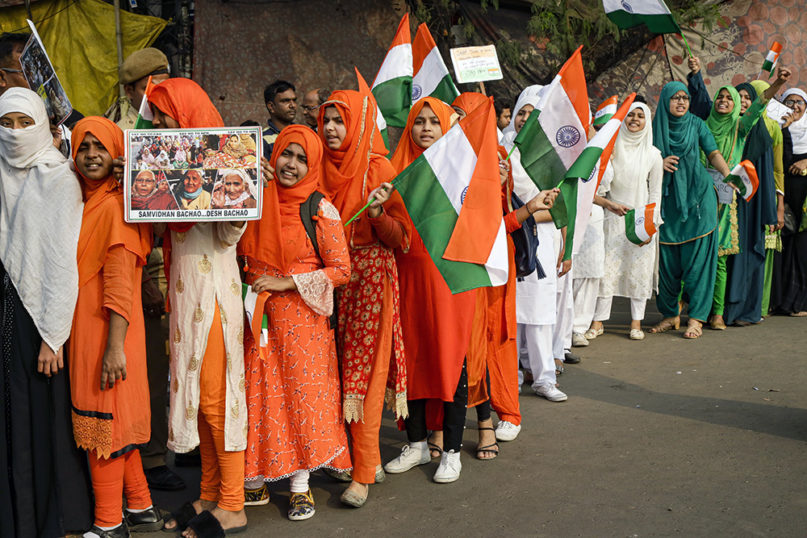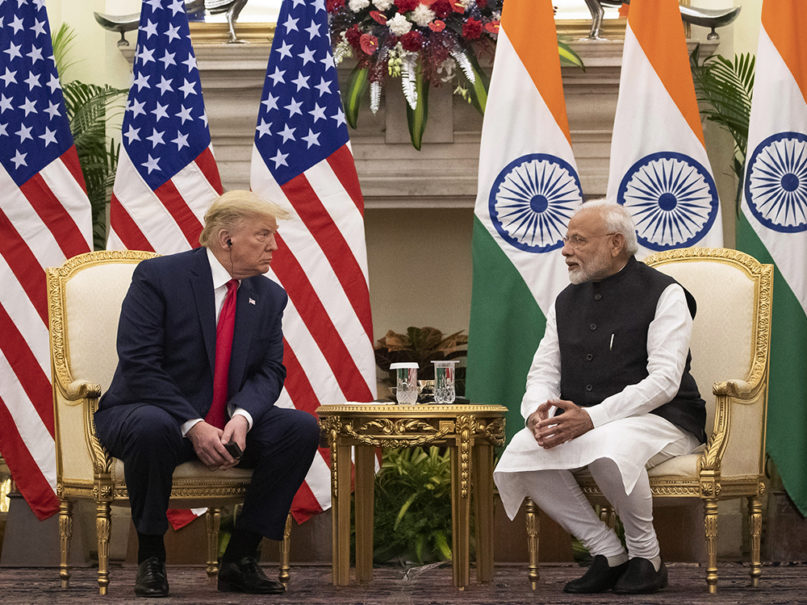(RNS) — President Donald Trump has made freedom of religion or belief — FoRB, in the parlance of human rights activists and scholars — a focus of his administration. His State Department has hosted two Ministerials to Advance Religious Freedom, bringing members of religious minorities who have experienced discrimination, harassment and persecution in their countries to Washington to discuss solutions and meet directly with the president and other high-ranking officials.
As he toured India with Prime Minister Narendra Modi this week, the president could have heard stories about an increasingly hostile environment in India, if he had only listened.
India is still processing the impact of the Citizenship Amendment Act, which passed in early December and updated an existing naturalization law to make provisions for migrants from Afghanistan, Bangladesh and Pakistan to become Indian citizens, but, controversially, excluded Muslims.
On several occasions the government has suggested that Muslims in these countries do not require protection, including by pointing out that Islam is the state religion in all three. However, arguments such as these fail to acknowledge the plight of Ahmadiyya, Shiite and Rohingya Muslims, all of whom face varying degrees of discrimination, harassment, persecution and religiously motivated violence in neighboring countries.
LATEST: New violence erupts in Indian capital over citizenship law
The United Nations has described the CAA as “fundamentally discriminatory.” Calling it the “largest statelessness crisis,” the European Parliament is set to debate and vote on the CAA and Jammu and Kashmir issue in March.
The CAA is latest indicator of the deteriorating situation for religious freedom under Modi. His government is dominated by the Bharatiya Janata Party, which is in turn influenced by its ideological ally, the Rashtriya Swayamsevak Sangh. The RSS seeks to harness religious nationalism and recast the world’s largest democracy as a Hindu rashtra, or nation.

Indian women march in a rally protesting against a new citizenship law that opponents say threatens India’s secular identity, in Kolkata, India, on Jan. 16, 2020. Protests against India’s citizenship law that excludes Muslim immigrants continue in Indian cities in a strong show of dissent against the Hindu nationalist government of Prime Minister Narendra Modi. (AP Photo/Bikas Das)
RSS activists and politicians under their sway are responsible for the widespread fueling of communal tensions, which have emboldened Hindu nationalists to attack Christian prayer meetings, and a rise in mob lynchings and other vigilantism stemming from hate speech and prejudice.
Another policy move demonstrating the BJP’s support for the pursuit of a Hindu rashtra was the abrogation of Articles 370 and 35A of the Indian Constitution. The move essentially stripped the Muslim-majority Jammu and Kashmir region of the autonomy it had been afforded since 1947 and allowed Indians from outside the region to purchase property and land there. It has sparked fear among Kashmiris who believe that the BJP wants to change the character of the region and bring it in line with the party’s wider vision of a nation where to be Indian is to be a Hindu.
Thousands took to the streets to protest the abrogation, which was accompanied by the deployment of nearly 38,000 troops to the region. While tensions have calmed, local human rights groups warn that without Article 370, the Jammu and Kashmir region is now vulnerable to infiltration by Hindu nationalist elements such as the RSS.
Despite this highly concerning picture for religious minorities, India was notably absent from the State Department’s most recent Countries of Particular Concern list, which highlights countries guilty of “particularly severe” violations of FoRB. It also remains a Tier 2 country, according to the United States Commission on International Religious Freedom, meaning that it is on a “watchlist” but does not meet the criteria for a CPC.
According to USCIRF, Tier 1 designation is given to countries in which violations of FoRB are “ongoing, systematic and egregious.” India clearly meets these criteria; violations of FoRB, including communal violence, harassment and forced displacement, have been taking place with increasing frequency in states across the country for years.
Given that FoRB has been a stated priority for the Trump administration, the president should have engaged robustly on these issues during his visit.
(Ellis Heasley is public affairs officer at CSW, a human rights organization specializing in freedom of religion. The views expressed in this commentary do not necessarily reflect those of Religion News Service.)





